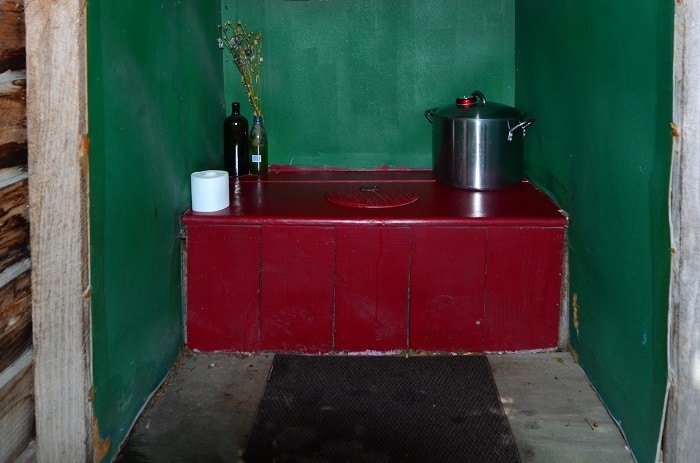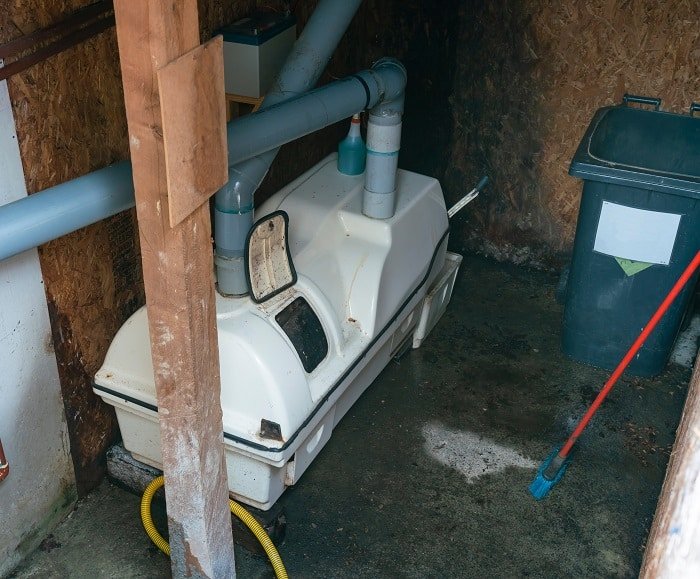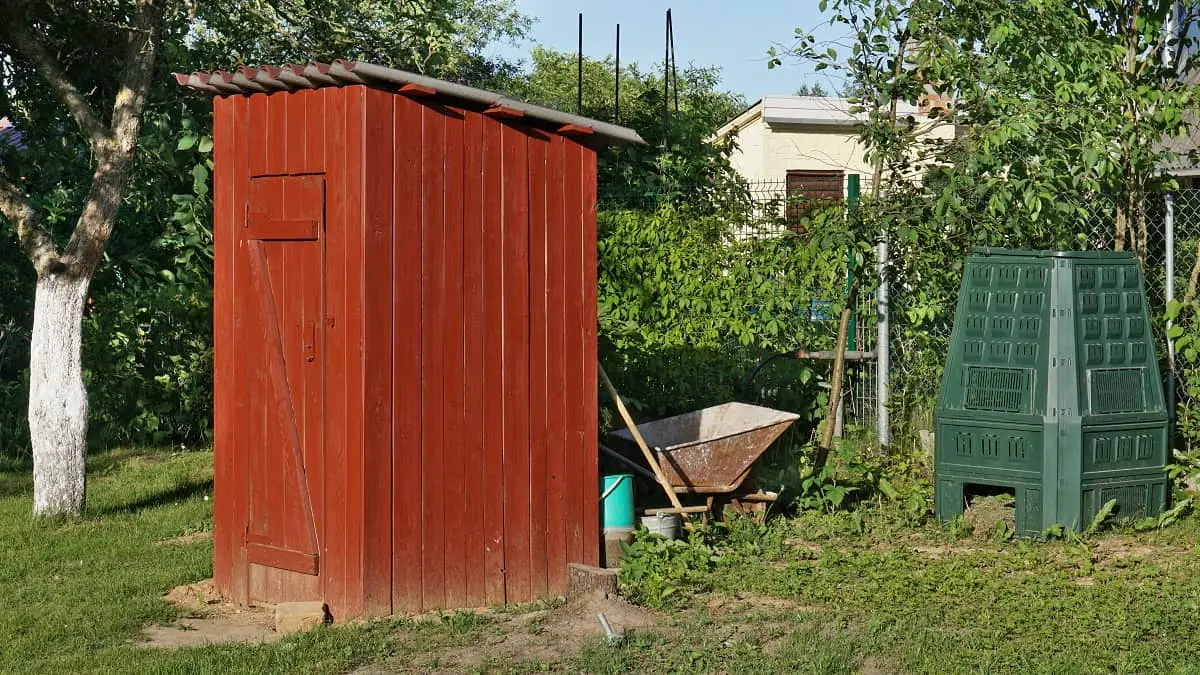In the journey towards helping our planet, you have probably turned to reducing, reusing and recycling your trash. One way to do this is by composting all your kitchen organic waste. If you already do that, then you can go one step further by installing a composting toilet. You may have some questions about them and we are here to deliver! So let’s get cracking and find out all about how do compost toilets work. Do compost toilets smell?
What is a Composting Toilet
A composting toilet is a device that by using the natural decomposition and evaporation processes, recycles human waste. In this way, you can reduce your water usage, not only at home but at water treatment facilities.
Basically you will keep your waste local and at home, without polluting the groundwater. In this way, you avoid either the sewer system or a septic tank.

It can also compost toilet paper that is thrown into it, so you will not have to worry about separating your bathroom trash also.
These types of commercially available toilets have three different goals in mind: they compost the waste and toilet paper quickly and without leaving any smell behind, they have to make sure the compost that is left behind is safe to handle and they need to evaporate the liquid that is in the waste.
They have been around for many decades. They were perfected in the ‘60s by a company called Sun-Mar. They were the forerunners of this industry.
How do Composting Toilets Work?
The three tasks that the toilet needs to perform, which we mentioned before, need three separate chambers. The composting chamber, the evaporating chamber, and the finishing drawer.
The Composting Chamber: Chamber Number 1
In this chamber, the toilet needs to create an ideal environment where the waste can decompose as it would in a regular compost pile. This needs to be warm, moist, with enough organic material and enough air.
This is usually made up of a sort of drum that can be rotated in order to incorporate air into the compost. Once ready, it can be rotated into the finishing chamber.
The compost needs oxygen for the bacteria to do their job correctly and thrive. If the mix is not tumbled periodically, the process will go much slower and will generate odor.
You want a composting chamber that does not apply direct heat. This is in order to avoid drying out the compost, which is another way of lengthening the decomposition process. Bacterias need moisture to live! You want to keep it between 40% and 60%.
Regarding warmth, the microbes themselves create enough heat to keep the compost warm enough in temperate climates. If you live in a very cold area, you may need an electric toilet that can indirectly warm up the composting chamber.
All of these precautions are to avoid the growth of anaerobic bacteria, which are the ones responsible for bad odors.
The Evaporating Chamber: Chamber Number 2
As we said, the compost must be kept moist enough but it must not be saturated. If there is an excess of liquid that cannot be absorbed by the compost, it will drain from the compost chamber into the evaporating chamber through a mesh.
The evaporating chamber is very different from the first chamber. It has a large surface area, it is well ventilated and it is in direct contact with heat.
These characteristics allow the moisture to evaporate rapidly. They usually have trays that can be removed and cleaned.

In electric models, there is a heat source places beneath the evaporating chamber. If they are not powered, the toilet needs to be connected to overflow vents. This is because passive venting is not enough to evaporate all the excess liquid and it can cause odor.
The Finishing Drawer: Chamber Number 3
This extra chamber allows compost that is finished to not be contaminated by fresh waste. It also allows the compost enough time to dry out until it is ready to be removed and used.
It has two functions: to keep the compost in an easily accessible, isolated container, while it helps to complete the composting process by drying it out a little bit more.
FAQ’s
How bad does a composting toilet smell?
The answer is that it varies, but it can smell quite bad. So bad, in fact, that many people find it hard to live with it. But the truth is, the smell of a composting toilet is much less than you might think, and if you can tolerate the odor for long enough, it won’t bother you as much as a conventional toilet.
However, the smell of a composting toilet is pretty minimal in most cases. As you can imagine, a composting toilet is fairly simple and requires very little maintenance to keep it smelling fresh. A composting toilet also allows you to have a more natural toilet system, which can be more environmentally friendly than using chemical products like bleach or ammonia to remove odors from your home.
It’s not described often as the stench of death, but it can be pretty rank. For example, it’s not uncommon for them to smell like rotten eggs. The compost itself is mostly fine, but some of it will produce smells that are off-putting to others.
Do they all smell the same?
It turns out that there’s more to the story than you might imagine. For example, you can have a composting toilet that smells like roses, or you can have one that smells like rotten eggs, depending on what kind of bacteria are present in your toilet’s waste.
Are they common?
Composting toilets are becoming increasingly popular in the U.S. They use organic waste to produce soil-like material that is used to grow plants in gardens and landscapes. There are many advantages of using composting toilets, but they can also have drawbacks.
How do I stop my compost toilet from smelling?
This is the question most homeowners ask when they see the compost toilet.
Here are some ideas:
-Use mulch as a cover, and sprinkle some baking soda on top of it. This will keep the smell away.
-Add some bark chips to the base of the pit. The bark will absorb moisture and help prevent odors.
-Try a worm farm. Worms are great for adding to the compost.
– Use an odor neutralizing compound (such as Potash, or a similar compound such as Cattleman’s Compost) that will help with odor. Or
– Use a different type of toilet, such as a sand pit toilet. In any case, you will need to add more material to your compost, and the smell will likely go away.
How often do you have to empty a composting toilet?
It depends on the kind of composting toilet you use. If you’re using a composting toilet that produces its own heat, you will not need to empty it as often as if you are using one that doesn’t. A composting toilet that produces its own heat is one in which the urine and feces are heated and turned into compost in the process.
I don’t want to empty my composting toilet more than once every 2 weeks.
Do Composting Toilets Make your Bathroom Smell Bad?
This depends on which model of composting toilet you install. If you install a composting toilet with a composting unit in the basement of your house, you will not have to worry about the actual compost smelling up your bathroom.
Our first advice would be then not to get a small composting toilet. The all in one units are smelly because you have everything in the same area. They also need to be emptied out very frequently, which can be a hassle.
We also recommend you buy the compost starter that the manufacturer suggests instead of using
There is another issue. Most composting toilets need to have the chambers we described above directly below the toilet itself. This may make some people squeamish, so we recommend you consider a foam flush or micro flush toilet.
These options will also let you install the toilet not directly above the composting chamber.
All in all, composting toilets are an amazing choice for the environment, but they are a big step for most families. You will need to consider how you are going to install them and where. If you live in a house, you need to budget for it as well because they do not come cheap.
Big composting toilets are really convenient, though. You will not need to empty it for at least a year after installing it, so it will be a win-win situation for you and your family. Probably even save you money in the long run.
If you do not have space, installing a small unit also works but it is smellier and this may not be a great option if your family is squeamish.
What do you think? Have you made the decision to install one? Comment below!





